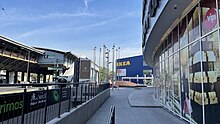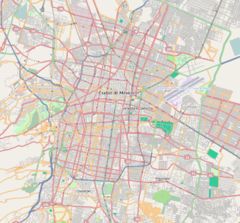Romero Rubio metro station
| STC rapid transit | |||||||||||
 Station sign, 2022 | |||||||||||
| General information | |||||||||||
| Location | Avenida Oceanía Venustiano Carranza, Mexico City Mexico | ||||||||||
| Coordinates | 19°26′27″N 99°05′40″W / 19.440735°N 99.094362°W | ||||||||||
| Owned by | Government of Mexico City | ||||||||||
| Operated by | Sistema de Transporte Colectivo (STC) | ||||||||||
| Line(s) | |||||||||||
| Platforms | 2 side platforms | ||||||||||
| Tracks | 2 | ||||||||||
| Connections |
| ||||||||||
| Construction | |||||||||||
| Structure type | Elevated | ||||||||||
| Accessible | Partial | ||||||||||
| Other information | |||||||||||
| Status | In service | ||||||||||
| History | |||||||||||
| Opened | 15 December 1999 | ||||||||||
| Passengers | |||||||||||
| 2023 | 4,882,287[1] | ||||||||||
| Rank | 97/195[1] | ||||||||||
| Services | |||||||||||
| |||||||||||
| |||||||||||
Romero Rubio metro station[a] is a station of the Mexico City Metro in the borough of Venustiano Carranza, Mexico City. It is an elevated station with two side platforms serving Line B (the Green-and-Gray Line), between Oceanía and Ricardo Flores Magón metro stations. The station was opened on 15 December 1999, providing northward service toward Villa de Aragón and southwestward service toward Buenavista metro station.
The station services the colonias (neighborhoods) of Moctezuma and Romero Rubio, along Avenida Oceanía. Additionally, it has been serving the Encuentro Oceanía shopping center since 2021. The station's name references the colonia of the same name, named after Manuel Romero Rubio, who served as Secretary of the Interior from 1884 to 1895. The station's pictogram depicts the silhouette of his bust. The station facilities offer partial accessibility for people with disabilities, featuring tactile pavings and braille signage plates.
In 2019, Romero Rubio station had an average daily ridership of 8,014 passengers, ranking it the 167th busiest station in the network and the 16th most used station on its line. The station area has experienced subsidence issues.
Location and layout
[edit]
Romero Rubio is an elevated metro station situated along Avenida Oceanía in the Venustiano Carranza borough, in northeastern Mexico City. The station serves two Colonias ("neighborhoods"), Moctezuma and Romero Rubio. The station's pictogram features the silhouette of Manuel Romero Rubio, the country's Secretary of the Interior between 1884 and 1895.[3][4]
Romero Rubio metro station has two exits. The northern exit is at the corner of Avenida del Peñón and Calle Oriente 158 in Colonia Moctezuma and the southern one is at Calle Marruecos in Colonia Romero Rubio. The station offers a partially disabled-accessible service with tactile pavings and braille signage plates.[3] The Encuentro Oceanía shopping center, which opened in 2021, is adjacent to the station and was the first major shopping center to open in the borough.[5][6] Metro authorities considered adding elevators and wheelchair ramps in response to the construction of Encuentro Oceanía.[5]
Within the system, the station lies between Oceanía and Ricardo Flores Magón metro stations.[3] The area is serviced by Routes 10-B and 18 of the Red de Transporte de Pasajeros bus network.[7]
History and construction
[edit]Line B of the Mexico City Metro was built by Empresas ICA.[4] Its first section opened on 15 December 1999, running from Buenavista to Villa de Aragón station.[8][9] The section between Romero Rubio and Oceanía spans 809 meters (2,654 ft) in length, while the segment between Romero Rubio and Ricardo Flores Magón measures 908 meters (2,979 ft).[10]
Incidents
[edit]From 23 April to 28 June 2020, the station was temporarily closed due to the COVID-19 pandemic in Mexico.[11][12]
Romero Rubio metro station has experienced subsidence issues. Israel Zamarrón from El Sol de México reported that the station was experiencing sinking and vibrations due to trains and heavy vehicles passing beneath it.[5] In July 2022, commuters noted that the station's header was uneven.[13] The system authorities inspected the station and confirmed that it was not at risk, stating that it is under continuous monitoring.[14] From January to September 2024, overnight repairs were conducted on the line's elevated stations, including Romero Rubio, to realign and regrade the tracks.[15][16]
Ridership
[edit]According to the data provided by the authorities, before the impact of the COVID-19 pandemic on public transport, commuters averaged per year between 7,800 and 9,500 daily entrances between 2013 and 2019; the station had a ridership of 2,925,132 passengers in 2019,[17] marking an increase of 62,023 passengers compared to 2018.[18] In 2019 specifically, Romero Rubio metro station ranked as the 167th busiest station out of the system's 195 stations and the 16th most used station on its line.[17]
| Annual passenger ridership | |||||
|---|---|---|---|---|---|
| Year | Ridership | Average daily | Rank | % change | Ref. |
| 2023 | 4,882,287 | 13,376 | 97/195 | +24.10% | [1] |
| 2022 | 3,934,214 | 10,778 | 110/195 | +74.31% | [1] |
| 2021 | 2,257,035 | 6,183 | 130/195 | +31.78% | [19] |
| 2020 | 1,712,731 | 4,679 | 160/195 | −41.45% | [20] |
| 2019 | 2,925,132 | 8,014 | 167/195 | +2.17% | [17] |
| 2018 | 2,863,109 | 7,844 | 168/195 | −4.93% | [18] |
| 2017 | 3,011,671 | 8,251 | 162/195 | +0.35% | [21] |
| 2016 | 3,001,060 | 8,199 | 163/195 | −8.83% | [22] |
| 2015 | 3,291,844 | 9,018 | 146/195 | −4.08% | [23] |
| 2014 | 3,431,783 | 9,402 | 143/195 | −3.41% | [24] |
Notes
[edit]- ^ Estación del Metro Romero Rubio. Spanish pronunciation: [roˈmeɾo ˈruβjo] .
References
[edit]- ^ a b c d "Afluencia de estación por línea (2022–2023)" [Station traffic by line (2022–2023)] (in Spanish). Sistema Transporte Colectivo Metro. 2024. Archived from the original on 27 January 2024. Retrieved 24 January 2024.
- ^ "Restaurantes Encuentro Oceanía: cuáles hay y horarios de la plaza IKEA" [Encuentro Oceanía Restaurants: which ones are there and the hours for the IKEA plaza]. Marca (in Spanish). 15 May 2023. Archived from the original on 25 September 2023. Retrieved 24 September 2023.
- ^ a b c "Romero Rubio" (in Spanish). Sistema Transporte Colectivo Metro. Archived from the original on 26 June 2023. Retrieved 25 June 2023.
- ^ a b "Línea B, Ciudad de México" [Line B, Mexico City] (in Spanish). iNGENET Infraestructura. 20 July 2009. Archived from the original on 21 May 2021. Retrieved 21 May 2021.
- ^ a b c Zamarrón, Israel (18 November 2020). "Plaza Encuentro Oceanía tendrá 2,800 cajones para autos pese a tener Metro a un lado" [Encuentro Oceanía shopping center will have 2,800 parking spaces despite being next to the Metro]. El Sol de México (in Spanish). Archived from the original on 19 November 2020. Retrieved 14 April 2024.
- ^ Estrada, Mildred (1 October 2021). "Preaperturan el centro comercial Encuentro Oceanía" [Pre-opening of the Encuentro Oceanía shopping center]. El Sol de México (in Spanish). Retrieved 14 April 2024.
- ^ "Red de Rutas" [Routes network] (in Spanish). Red de Transporte de Pasajeros. Retrieved 30 October 2021.
- ^ Grajeada, Ella (27 November 2000). "Abrirán en tres días la línea 'B'" [Line B will open in three days]. El Universal (in Spanish). Archived from the original on 21 May 2021. Retrieved 21 May 2021.
- ^ Velázquez, Miguel (10 January 2019). "Usuarios reportan problemas en la Línea B del Metro" [Commuters report problems on Line B of the Metro]. Publimetro (in Spanish). Archived from the original on 21 May 2021. Retrieved 21 May 2021.
- ^ "Longitud de estación a estación por línea" [[Length from station to station by line] (in Spanish). Sistema de Transporte Colectivo Metro. Archived from the original on 4 May 2021. Retrieved 12 July 2021.
- ^ "Cierre temporal de estaciones" [Temporary closure of stations.] (PDF) (in Spanish). Metro CDMX. Archived (PDF) from the original on 4 July 2020. Retrieved 25 April 2020.
- ^ Hernández, Eduardo (13 June 2020). "Coronavirus. Este es el plan para reabrir estaciones del Metro, Metrobús y Tren ligero" [Coronavirus. This is the plan to reopen Metro, Metrobús, and Light Rail stations]. El Universal (in Spanish). Archived from the original on 4 July 2020. Retrieved 15 June 2020.
- ^ Ponce, JC (28 July 2022). "Alertan por columna desnivelada en estación Romero Rubio del Metro" [Warning issued for unlevel column at Romero Rubio station of the Metro]. Excélsior (in Spanish). Archived from the original on 24 November 2022. Retrieved 14 April 2024.
- ^ Ponce, JC (28 July 2022). "Columna en estación Romero Rubio no representa riesgo: Metro" [Column at Romero Rubio station poses no risk: Metro]. Excélsior (in Spanish). Archived from the original on 29 July 2022. Retrieved 14 April 2024.
- ^ Mejía, Michelle (27 December 2024). "Línea B del metro será renivelada por las noches; anuncian fecha de trabajos en tramo de San Lázaro a Oceanía" [Metro Line B will be regraded at night; work dates announced for the section from San Lázaro to Oceanía]. Telediario (in Spanish). Retrieved 14 April 2024.
- ^ Reyes Padrón, Jorge (3 September 2024). "¡Línea B del Metro será más rápida que antes! Estos son los motivos" [Metro Line B will be faster than before! Here are the reasons]. Récord. Retrieved 5 September 2024.
- ^ a b c "Afluencia de estación por línea 2019" [Station traffic by line in 2019] (in Spanish). Sistema Transporte Colectivo Metro. 2020. Archived from the original on 8 April 2020. Retrieved 3 May 2020.
- ^ a b "Afluencia de estación por línea 2018" [Station traffic by line in 2018] (in Spanish). Sistema Transporte Colectivo Metro. 2019. Archived from the original on 6 June 2019. Retrieved 7 April 2020.
- ^ "Afluencia de estación por línea 2021" [Station traffic by line in 2021] (in Spanish). Sistema Transporte Colectivo Metro. 2020. Archived from the original on 7 March 2022. Retrieved 7 March 2022.
- ^ "Afluencia de estación por línea 2020" [Station traffic by line in 2020] (in Spanish). Sistema Transporte Colectivo Metro. 2021. Archived from the original on 21 June 2021. Retrieved 21 June 2021.
- ^ "Afluencia de estación por línea 2017" [Station traffic by line in 2017] (in Spanish). Sistema Transporte Colectivo Metro. 2019. Archived from the original on 3 May 2020. Retrieved 3 May 2020.
- ^ "Afluencia de estación por línea 2016" [Station traffic by line in 2016] (in Spanish). Sistema Transporte Colectivo Metro. 2017. Archived from the original on 3 May 2020. Retrieved 3 May 2020.
- ^ "Afluencia de estación por línea 2015" [Station traffic by line in 2015] (in Spanish). Sistema Transporte Colectivo Metro. 2016. Archived from the original on 3 May 2020. Retrieved 6 May 2020.
- ^ "Afluencia de estación por línea 2014" [Station traffic by line in 2014] (in Spanish). Sistema Transporte Colectivo Metro. 2015. Archived from the original on 3 May 2020. Retrieved 6 May 2020.
External links
[edit] Media related to Romero Rubio (station) at Wikimedia Commons
Media related to Romero Rubio (station) at Wikimedia Commons- "Metro Romero Rubio". At the Official Guide to Mexico City.



